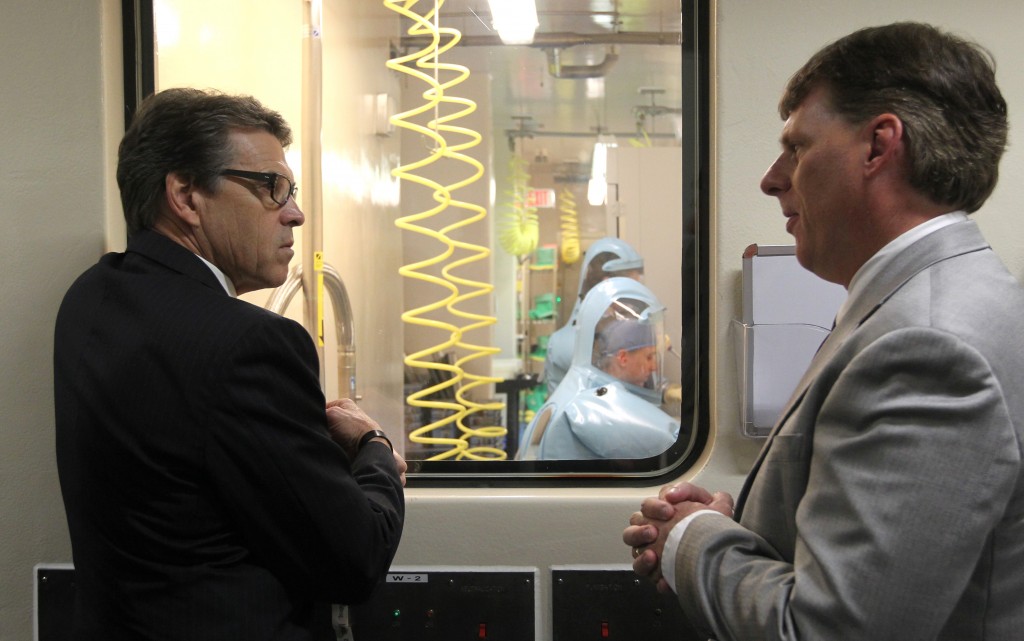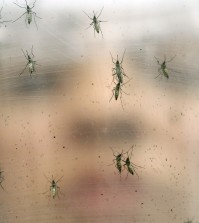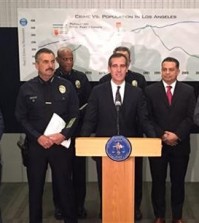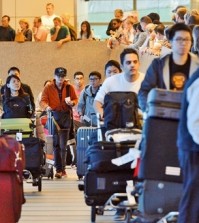- California Assembly OKs highest minimum wage in nation
- S. Korea unveils first graphic cigarette warnings
- US joins with South Korea, Japan in bid to deter North Korea
- LPGA golfer Chun In-gee finally back in action
- S. Korea won’t be top seed in final World Cup qualification round
- US men’s soccer misses 2nd straight Olympics
- US back on track in qualifying with 4-0 win over Guatemala
- High-intensity workout injuries spawn cottage industry
- CDC expands range of Zika mosquitoes into parts of Northeast
- Who knew? ‘The Walking Dead’ is helping families connect
‘LA is fully prepared for Ebola’
LOS ANGELES (CNS) – Local health officials told the Board of Supervisors today that they are fully prepared to protect Los Angeles County residents from the Ebola virus, but do not expect an outbreak.
“There are no cases of Ebola in Los Angeles County,” said Dr. Jeffrey Gunzenhauser, one of the county’s top public health officials.
The case of a patient in Dallas, who was originally turned away and later determined to have the often deadly virus, has raised the level of concern and fear across the country.
The World Health Organization has reported more than 7,400 cases of Ebola and more than 3,400 deaths due to the virus in the West African countries of Guinea, Liberia and Sierra Leone.
“The epidemic is out of control,” Gunzenhauser said. He added that experts now project that there may be more than 20,000 cases within the month.
But Gunzenhauser stressed that the spread of the disease has been rampant in countries where access to basic healthcare is very limited, and Los Angeles County boasts a “first-class healthcare system.”
Dr. Mitchell Katz, who runs the county’s hospital system, said he believed that any cases here could be effectively isolated.
“If there is a case of Ebola, we will be able to protect that patient, prevent the spread and protect our healthcare workers,” Katz told the board.
Healthcare workers and support staff at public and private hospitals have been alerted to the risks and trained in appropriate protocols, he said.
“We’re doing all we can to inform front-line providers … to call us immediately” if any suspected case is identified, Katz said.
There have been seven cases where county healthcare workers had to assume that patients had Ebola, based on symptoms and travel histories, according to Katz. All seven were put in isolation and confirmed not to have the virus, he said, pointing to the work as an effective training exercise.
The kind of precautions required to prevent the spread of the disease are already in regular use, both county health officials said.
Ebola is contagious only through direct contact with an infected patient or their bodily fluids and cannot be transmitted through the air, making it easier to contain, they said.
No high-tech equipment is required to effectively isolate a patient, Gunzenhauser said.
“All you need is a room with a door and a private bathroom,” he said. Staff need to be trained to always wear protective gear.
A nurse’s assistant in Spain contracted the virus after treating two patients who died of Ebola. She has been cited as the first case of the virus contracted outside of West Africa.
In addition to training healthcare workers, county officials have been coordinating with the Centers for Disease Control and Prevention.
Airport officials also have a protocol in place in the event a passenger needs to be transported to a local hospital, Gunzenhauser said, while pointing out that “there are no direct flights from Western Africa to Los Angeles.”
Supervisor Michael Antonovich, who asked for the update on precautions being taken against Ebola, noted that travelers in China submit to temperature checks as part of regional efforts to control the spread of disease. He asked whether a similar procedure could be instituted here.
Gunzenhauser said he believed airlines were considering the possibility, but he couldn’t say how likely it was to be instituted.
President Barack Obama said Monday that additional screening measures were being considered, calling Ebola a national security priority.

Tom Geisbert, right, a professor of Microbiology and Immunology at the University of Texas Medical Branch, explains to Texas Gov. Rick Perry the work researchers are conducting in a Bio Safety Level 4 lab in the Galveston National Laboratory on Tuesday, Oct. 7, 2014. Perry and other state officials toured the national laboratory a day after he created a Task Force on Infectious Disease Preparedness and Response. (AP Photo/The Daily News, Jennifer Reynolds, Pool)
















